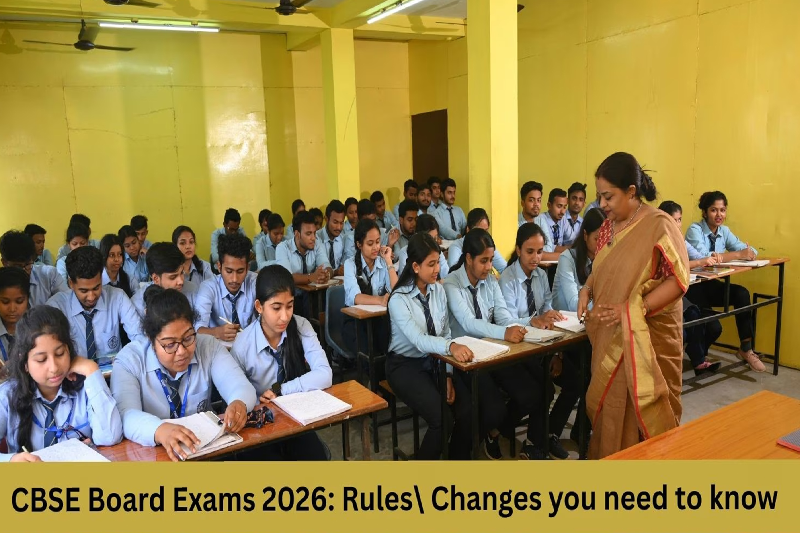
CBSE Board Exams 2026: Major Changes You Need to Know – Two-Term Exams, OBAs, New Attendance Rules & More
In a significant overhaul of India’s school examination system, the Central Board of Secondary Education (CBSE) has introduced a series of sweeping changes to the 2026 board exams and beyond. These updates, aimed at modernizing assessments and aligning with the National Education Policy (NEP) 2020, will impact students, educators, and institutions alike. Here’s a detailed overview of what’s changing and how it affects various stakeholders.
1. Two-Term Board Exams for Class 10
Starting with the 2026 academic session, CBSE will implement a two-term examination system for Class 10.
- The first exam will take place in mid-February 2026, while the second will be conducted in May 2026.
- Both exams will be considered main board examinations, not pre-boards or half-yearlies.
- This move aims to reduce exam stress and offer multiple opportunities for performance evaluation.
2. Open-Book Assessments (OBAs) from 2026–27
From the 2026–27 academic year, CBSE will introduce Open-Book Assessments (OBAs) for Class 9 students.
- This decision follows a pilot project conducted in 2023 involving students from Classes 9 to 12.
- OBAs will encourage conceptual learning and analytical thinking, moving away from rote memorization.
- Details on implementation, subjects covered, and evaluation methods are expected to be released in due course.
3. 75% Minimum Attendance Rule Reinforced
CBSE has reiterated the mandatory 75% attendance requirement for all students appearing in the Class 10 and 12 board exams during the 2025–26 session.
- Schools are expected to monitor and report attendance accurately.
- This rule is part of an effort to ensure consistent classroom engagement and participation.
- No relaxation has been announced, barring exceptional cases (e.g., medical or national representation).
4. STEM Subjects to Be Offered at Two Levels
After previously offering Science and Social Science at basic and standard levels in the secondary stage, CBSE is now preparing to extend this model to STEM subjects in higher secondary classes.
- Starting from the 2026–27 academic session, Class 11 students will be able to choose between basic and advanced versions of select STEM subjects.
- This aims to cater to students with varying interests and academic strengths, improving subject accessibility and depth.
5. Private Candidates Can No Longer Choose 'Additional Subjects'
In a significant policy shift, CBSE has removed the option for private candidates to appear for an ‘additional subject’ starting 2026.
- This change has been criticized by students, particularly because it was not communicated earlier.
- CBSE clarified that schooling is not just about passing exams, and the focus should remain on continuous academic engagement.
- The move discourages exam-only participation and promotes structured learning environments.
6. Special Provisions for Sports and Olympiad Participants
Students representing India in national/international sports events or Olympiads will benefit from flexible exam options:
- For Class 10, such students can only appear in the second exam cycle in May 2026. No separate exams will be conducted after the first cycle.
- They must still be included in the List of Candidates (LOC) for the main exam.
- Class 12 students will continue to have the existing policy, which allows re-examination in case of a date clash with recognized competitions.
- For compartment exams, these will be conducted in February or March 2026.
7. Mother Tongue-Based Education for Early Learners
As part of the NEP 2020 directives, CBSE has instructed schools to map students’ mother tongues and conduct instruction from pre-primary to Class 2 in a familiar regional language or the child’s mother tongue.
- This move aims to strengthen foundational learning by using a language children are most comfortable with.
- Schools must now adjust teaching strategies and resources accordingly.
8. Enhanced Surveillance: CCTV Now Mandatory
Under updated affiliation norms, CBSE now mandates the installation of high-resolution CCTV cameras with audio-visual recording across all key areas of the school campus.
- This falls under Chapter 4 of the affiliation by-laws, focusing on physical infrastructure.
- The measure is aimed at increasing transparency, safety, and discipline within school premises.
- Schools are expected to implement this without delay to maintain affiliation compliance.
9. ‘Sugar Boards’ to Promote Healthy Eating
In a unique health-centric initiative, CBSE has directed all affiliated schools to set up ‘Sugar Boards’.
- These are informational and awareness platforms aimed at reducing excessive sugar intake among students.
- The directive, issued on May 14, 2025, is part of a broader national health initiative.
- Schools are expected to include visual displays and educational materials on the harmful effects of added sugar in diets.
10. CBSE to Launch Educational Podcasts and Digital Resources
To provide guidance and support for students, parents, and schools, CBSE is developing a range of in-house educational podcasts and digital content.
- These resources will focus on academic advice, exam preparation, mental health, and counseling support.
- The board aims to make learning more engaging and accessible beyond the classroom.
Conclusion: A New Era for CBSE Examinations
The CBSE's changes for 2026 mark a major paradigm shift in India’s school education landscape. From structural reforms like the two-exam policy to pedagogical updates like OBAs and mother tongue instruction, these changes aim to modernize and personalize education while maintaining academic rigor.
Students, parents, and educators must now gear up for these transitions, as early awareness and preparation will be key to navigating the 2026 CBSE board exams successfully.
Stay updated with CBSE’s official announcements and ensure your school is compliant with the latest requirements to make the most of these educational reforms.



